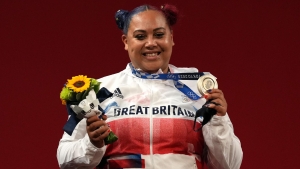Emily Campbell believes giving back to the community that supported her Olympic dreams is more important than winning another medal in Paris.
The 29-year-old became Britain’s first female Olympic medallist in weightlifting when she claimed silver in the +87 kilograms category in Tokyo in 2021.
She will bid for more success in Paris this summer, but Campbell is just as excited about the new ChangeMaker initiative, which will see Olympic and Paralympic stars get involved in local community causes in the two weeks after their respective Games.
View this post on Instagram
A post shared by Team GB (@teamgb)
The programme is a partnership between The National Lottery’s operator, Allwyn, Team GB, ParalympicsGB and UK Sport, and Campbell told the PA news agency: “We’re going to use the amazing momentum and excitement and buzz from the Games to motivate athletes to go back into their community and to do anything that they’re really passionate about.
“It could be to do with sport, it could be to do with environment, whatever they feel they can make a difference in. It’s all really, really exciting.”
Campbell’s success is very much rooted in the Nottinghamshire town of Bulwell where she grew up, and she admits she is “torn” about which project she will support.
“There’s a lot of good things going on and it’s probably going to be hard for me to pick but I’ll probably just be out there trying to help as many as I can,” she said.
“Everyone says it takes a village to raise a child, right, and it takes a community to make an Olympic medallist. That’s what my community did for me, from giving me free fruit and veg to supporting me when I was trying to raise money, the cobbler fixing my boots, the list goes on and on and on.
“Everybody goes to the Olympics and everybody wants a medal but for me now it’s more about giving back and being a part of something that actually means something.
“Instead of sitting there and saying ‘I’m an inspiration and I want to be a role model’, it’s about putting your money where your mouth is and getting it done. And you never know, we might find another little Olympic champion somewhere.”
Campbell’s dream of opening a gym in Nottingham focused on youth and development will have to wait until after her career is over, and there will be many more medals still to come if she can maintain the consistency she has shown since Tokyo.
View this post on Instagram
A post shared by Emily Campbell (@emilyjade_gb)
Silver and bronze medals have followed at world level while she has won the European title for four years in a row and Commonwealth gold on home soil in Birmingham in 2022.
Having a platform has enabled Campbell not just to recognise the support given to her but to “shout” about a linked passion, showing women and girls that sport and exercise is for everyone and changing perceptions of what healthy looks like.
Three years on from her Olympic breakthrough, Campbell is encouraged but not satisfied, saying: “We’re getting there. I wouldn’t say that it’s completely changed, I wouldn’t say we’re where we need to be but people hopefully are listening – I’ve definitely shouted enough about it.
“You are seeing now a lot more of an inclusive space within the fitness industry. Brands are starting to do the right thing. This all filters back down to what our young people see. They want to see people that represent them, that look like them, and that encourages them to get involved.
“It’s always going to be an ongoing battle and, as long as I’ve got a voice and people can hear me, I’m going to shout about it.”
Campbell is made aware of the impact her words and actions have every day through messages and interactions, and she said: “It’s actually overwhelming sometimes. I want to say I do see everything that comes into my inbox but as you can imagine it is (busy) in there.
“The amount of people that have said they’ve started lifting, or they’ve lost X amount of weight or they’ve started doing a certain dance class, or they’ve just done something that they feel has made a positive impact on their life.
“People do stop me in the street as well, it’s absolutely amazing and I can’t thank everybody enough for the support.”





























